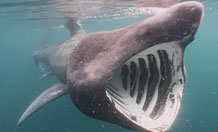
A basking shark surrounded by fish. Photo by Rachel Hosken.
Helping to protect giants of the ocean
Researchers at the University of Exeter are helping to find out more about basking sharks, one of the biggest marine visitors to UK waters, as part of ongoing conservation work.
The university is working with the Marine Conservation Society (MCS), which has been collecting data on these giant but endangered sharks for more than two decades.
Under its Basking Shark Watch programme, the MCS encourages members of the public to report any basking shark sightings off the UK coastline. This information is then used to find out more about the sharks' numbers, movements and behaviour, as well as assess threats they may face.
Evan Landy, a Masters student with the university, is working with the MCS to help analyse data from the past few years. He will also be interviewing people who live and work along the Cornish coastline, which is a hotspot for basking sharks, to see if local knowledge matches the findings of the shark spotting scheme.
He said: “We need to know as much as possible about basking sharks to make sure that the right things are being done to protect them. I’m hoping to tap into the local knowledge of fisherman, surfers, coastal walkers, swimmers, and anyone else who may regularly see these sharks up close in Cornwall. The information they provide could help inform future conservation efforts.”
The MCS is urging people to continue to report sightings of basking sharks as the information is essential to carry out work to protect them.
This year, several of the sharks have already been spotted as they cruise close to the shore, hoovering up vast amounts of plankton through their gaping mouths.
Last month’s warm weather has resulted in more early close encounters for coastal walkers, as the sharks appear to have come about a month early to the South West compared to ‘usual’ years when they start appearing in May.
Dr Jean-Luc Solandt, MCS Biodiversity Policy Officer, said: “This year we hope to get even more information about the lives of these massive sharks. As well as encouraging spotters to record sightings online, we are also working with the University of Exeter to carry out a detailed survey of local knowledge and opinion about basking sharks in Cornwall.
“The more we can map the location of these creatures over time, the more we can discover about their lives and ensure they continue to thrive in our waters. With so many people carrying smart phones these days, it’s easy to go straight to our website, record your sighting and take a picture and upload it directly to our Facebook page, all within moments of seeing a basking shark.”
The MCS Basking Shark Watch programme holds the biggest database of publicly reported sightings in the world and has led to MCS successfully campaigning for the protection of basking sharks under UK and International laws.
In collaboration with the Shark Trust, MCS has produced the Basking Shark Code of Conduct, which provides clear guidance on how the public can behave safely around basking sharks. You can find out more on the
Date: 17 May 2011
